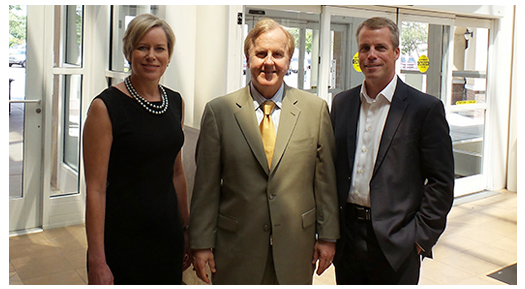|
July 21, 2014
Message from the President
 The Senate last week overwhelmingly approved a seven-year extension of the Terrorism Risk Insurance Act (TRIA) by a 93-4 vote. This represents a significant step in the right direction toward keeping long-term stability in the marketplace for insurance against acts of terrorism. The Senate last week overwhelmingly approved a seven-year extension of the Terrorism Risk Insurance Act (TRIA) by a 93-4 vote. This represents a significant step in the right direction toward keeping long-term stability in the marketplace for insurance against acts of terrorism.
NAREIT and its partners in the Coalition to Insure Against Terrorism (CIAT) have worked diligently to see that TRIA, which is set to expire at the end of the year, is extended once again. Since 2002, the program has played a vital role in helping to facilitate a fully functional terrorism risk insurance market. TRIA was enacted in the wake of the 9/11 terrorist attacks after which primary insurers and reinsurance companies withdrew from the marketplace, contributing to tens of thousands of job losses. Since its enactment, Congress has reauthorized the program twice with bipartisan support.
The decisive margin of the Senate vote illustrates not only the strong support for the program, but policymakers’ recognition of its importance to the country’s economy.
The House of Representatives is set to consider its own TRIA reauthorization proposal in the coming weeks. Its version of the bill, dubbed the TRIA Reform Act of 2014, includes a number of modifications to the program as it is currently designed. NAREIT believes that the House bill is a constructive and good faith effort, but that the Senate bill is a better approach. As Congress moves toward agreement on final legislation for President Obama to sign into law, NAREIT and CIAT will work to ensure the U.S. has in place a viable terrorism insurance marketplace backstopped by federal support for catastrophic-level events.

Steven A. Wechsler
President and CEO
Senators Introduce New Bill Incorporating Marketplace Fairness Act
 A bipartisan group of senators last week introduced the Marketplace and Internet Tax Fairness Act (MITFA), which incorporates provisions from the previously passed Senate version of the Marketplace Fairness Act. A bipartisan group of senators last week introduced the Marketplace and Internet Tax Fairness Act (MITFA), which incorporates provisions from the previously passed Senate version of the Marketplace Fairness Act.
The bill, introduced by Sens. Mike Enzi (R-WY), Dick Durbin (D-IL), Lamar Alexander (R-TN), Heidi Heitkamp (D-SD), Susan Collins (R-ME) and Mark Pryor (D-AR), also incorporates the Internet Tax Freedom Act. The extension of the Internet Tax Freedom Act would prohibit states from levying taxes on Internet access or levying multiple or discriminatory taxes on electronic commerce through 2024.
The Marketplace Fairness Act, which the Senate previously approved by a 69-27 vote, would enable states and local governments to enforce existing state and local sales and use tax laws if they simplify sales and use tax administration and collection and exempt small online retailers from collection requirements. As a result, MITFA would provide tax-free access to the Internet, increase tax parity for brick-and-mortar and Internet retailers, simplify state tax filing for individuals and help address state budget shortfalls at no cost to the federal government.
“NAREIT appreciates the leadership of the bill’s sponsors in bringing this important legislation forward,” said NAREIT President and CEO Steven A. Wechsler. “This law is necessary to ensure that there is tax consistency and fairness throughout the retail marketplace no matter how goods are sold to the consumer.”
(Contact: Dara Bernstein at dbernstein@nareit.com)
NAREIT Comments on Draft Proposal for Notes to Financial Statements
 In comments submitted last week to the Financial Accounting Standards Board (FASB) regarding its draft proposal to improve the effectiveness of disclosures in the notes to financial statements, NAREIT said it does not believe that the framework outlined in FASB’s exposure draft would achieve the project’s objective. In comments submitted last week to the Financial Accounting Standards Board (FASB) regarding its draft proposal to improve the effectiveness of disclosures in the notes to financial statements, NAREIT said it does not believe that the framework outlined in FASB’s exposure draft would achieve the project’s objective.
“Rather than improving disclosure effectiveness and eliminating redundancy, we believe that the proposed framework could expand possible disclosure requirements significantly because it does not provide clear direction,” NAREIT wrote in its comments.
NAREIT provided a number of recommendations to enhance the disclosure framework. Among them, NAREIT suggested that the FASB re-evaluate the purpose of the project and ensure that disclosures address each of the financial statements, not just the balance sheet.
(Contact: Chris Drula at cdrula@nareit.com)
NAREIT Investor Outreach Working Abroad
 NAREIT is working to ensure that its members are fully represented in a competitive global environment where the sources of capital have become more diversified. NAREIT is working to ensure that its members are fully represented in a competitive global environment where the sources of capital have become more diversified.
For example, over the past two years, Canada and Latin America have led the volume of continental capital entering the U.S., with Canadian investors being the most active. Latin American and Asian investors have been the fastest growing exporters of capital.
While somewhat less dramatic, capital investment in U.S. real estate from countries such as Switzerland, Sweden and the Netherlands is also on the rise. Both Nordic and Middle Eastern sovereign wealth funds have announced plans to increase their cross-border investment.
As investors outside the U.S. warm to the diversification benefits of global real estate investment through stock exchange-listed REITs and property companies, new opportunities become available for attracting additional investment into U.S. REITs. In response to these opportunities, NAREIT continues to develop relationships that reach out to global real estate investors, media outlets and policymakers to make sure the REIT-based real estate investment opportunity in the U.S. is accurately communicated around the globe.
(Contact: Meredith Despins at mdespins@nareit.com)
REIT.com Videos: Market Insights
REIT.com continues to provide a steady stream of interviews with analysts and newsmakers in the real estate industry.
 T. Ritson Ferguson, CEO and CIO of CBRE Clarion Securities, says REITs are performing well across the board in 2014. He singles out the mall sector as the biggest surprise. Despite the concerns regarding the threat that e-commerce poses to mall companies, “the sentiment hasn’t overwhelmed the fundamental story of these stocks,” according to Ferguson. T. Ritson Ferguson, CEO and CIO of CBRE Clarion Securities, says REITs are performing well across the board in 2014. He singles out the mall sector as the biggest surprise. Despite the concerns regarding the threat that e-commerce poses to mall companies, “the sentiment hasn’t overwhelmed the fundamental story of these stocks,” according to Ferguson.
CLICK HERE for more of Ferguson’s interview with REIT.com.
 Activity in the real estate capital markets remains steady, according to Mark Decker Jr., group head of U.S. real estate, lodging and leisure at BMO Capital Markets. Decker says he expects to see more REIT IPOs in the near future. In the single-family housing sector, Decker notes that those offerings will likely received heightened scrutiny from the market. Activity in the real estate capital markets remains steady, according to Mark Decker Jr., group head of U.S. real estate, lodging and leisure at BMO Capital Markets. Decker says he expects to see more REIT IPOs in the near future. In the single-family housing sector, Decker notes that those offerings will likely received heightened scrutiny from the market.
CLICK HERE for more of Decker’s interview with REIT.com.
 In a CEO Spotlight video interview, Chad Williams, president and CEO of data center REIT QTS Realty Trust, Inc. (NYSE: QTS), says his company’s diversified product offerings, scale and integrated technology service platform set it apart. When it comes to misconceptions about QTS Realty’s business, the level of sophistication required to effectively run data center facilities isn’t well understood. In a CEO Spotlight video interview, Chad Williams, president and CEO of data center REIT QTS Realty Trust, Inc. (NYSE: QTS), says his company’s diversified product offerings, scale and integrated technology service platform set it apart. When it comes to misconceptions about QTS Realty’s business, the level of sophistication required to effectively run data center facilities isn’t well understood.
CLICK HERE for more of Williams’ interview with REIT.com.
Visit the REIT.com video section for more exclusive interviews.
(Contact: Matt Bechard at mbechard@nareit.com)
REITs in the Community

July 2: Rep. Robert Pittenger (R-NC), center, visited The Carolina Place in Charlotte, N.C., a property owned and operated by General Growth Properties (NYSE: GGP). Pittenger, a member of the House Financial Services Committee, toured the mall and received a briefing on its economic impact in the area as well as GGP’s activities in North Carolina and across the nation. He was joined on the tour by GGP’s Susan Barwick, general manager of The Carolina Place, and Kevin Berry, vice president of investor relations. After the tour, Pittenger was briefed on several legislative issues pending before Congress impacting the REIT industry, including the Marketplace Fairness Act, reauthorization of the Terrorism Risk Insurance Act and tax reform.
(Contact: Jessica Davis at jdavis@nareit.com)
|

 The Senate last week overwhelmingly approved
The Senate last week overwhelmingly approved 
 A bipartisan group of senators last week introduced the
A bipartisan group of senators last week introduced the  In
In  NAREIT is working to ensure that its members are fully represented in a competitive global environment where the sources of capital have become more diversified.
NAREIT is working to ensure that its members are fully represented in a competitive global environment where the sources of capital have become more diversified.



